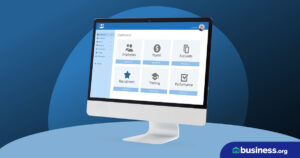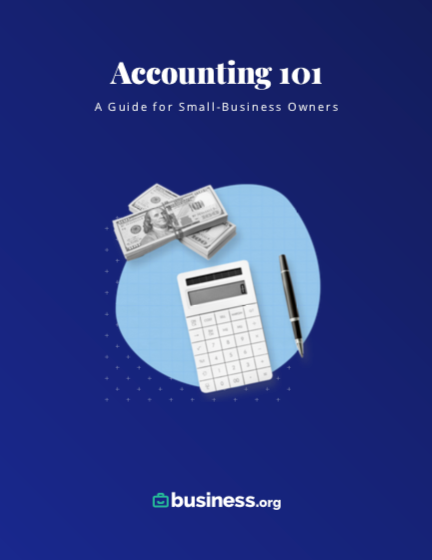💸 See if your business qualifies for a tax credit worth up to $26k per employee. 📞 Call Now: 855-979-9597
14 Small Business Owners Reveal Their Cringiest Payroll Mistakes
We are committed to sharing unbiased reviews. Some of the links on our site are from our partners who compensate us. Read our editorial guidelines and advertising disclosure.
They say there’s nothing certain in life but death and taxes. Well, we at Business.org beg to add payroll to that list. And with paycheck cutting comes inevitable mistakes, some worse than others.
That’s why Business.org spoke to over 100 small-business owners to hear their payroll mistakes and learn their advice for new entrepreneurs still learning payroll and the administrative ropes.
Let’s hear their stories, as told to Business.org in their own words.
1. Forgetting about taxes
I remember being shocked after calculating our first payroll at how hiring one person for $10 an hour for 20 hours a week did not, in fact, equal me paying them $200. It actually equates to much more. This is obvious to me now, and I keep it a conscious thought when scheduling our growing crew—but 2014-me had no clue. New entrepreneurs should be mindful of this when creating a business plan and planning for staff!
-Rebecca Miller, owner of Peggy Jean’s Pies
By signing up I agree to the Terms of Use and Privacy Policy.
2. Paying taxes at the wrong rate
Tax rates change often, so whatever rates you started using to pay your staff may no longer be appropriate or proper. If you pay the wrong rate, you'll have to pay back any taxes, fines, or Interest. Also, keep an eye out for any extra taxes based on your region.
-Charles McMillan, founder of Stand with Main Street
3. Missing deadlines
I have a lot of different employees at my company: part-time, remote and full-time workers. They get paid at different times during the month and keeping track of their salaries can get very confusing. When I used to do all accounting myself, it was hard to figure how much payroll taxes I had to pay and when. One time, I mixed up some of the due dates of two coworkers, and ended up paying late for both of them. I had to pay a heavy tax penalty to the IRS. Since then I’ve implemented payroll software that lets me stay on top of all the due dates, and I’ve never been late again.
-John Marsano, CEO & president at Inheritance Advanced
4. Not reporting correctly
As a business owner, the biggest payroll mistake I made was to not report all forms of taxable employee compensation. Employee pay comprises more than salary, overtime, commissions and bonuses; it also includes stock options, rewards like gift cards, and personal use of company cars. By neglecting to mention all forms of compensation in the payroll, I once got my organization a tax filing penalty. Since then, I’ve been extra mindful of taking into account all taxable employee pay forms.
-Bishal Biswas, CEO at Word Finder
5. Not keeping physical copies of payroll reports
Always print physical copies of your payroll reports when you run payroll. I used to think our payroll provider kept records of our payroll data in perpetuity, storing that info forever. But much like bank statements, I came to find out that they only store these reports for a certain amount of time, after which, it's gone. And if you ever get a request for info from your state's employment department or tax agency, you're going to need that information. This happened to us, and when I came up empty-handed after finding out our payroll service had deleted those old records from the cloud, it created a nightmare situation.
-John Ross, CEO of Test Prep Insight
6. Not being organized
Simply having all of your essential payroll and employee records and information organized in an efficient and correct way is a frequent issue. It's sometimes just a question of workflow: failing to store files and papers in a central place or failing to establish consistent filing procedures. For example, keeping and sorting paper checks is a common problem.
-Derek Warburton, CEO and Media Entrepreneur
7. Complying with garnishments
The rare incidence of court judgments mandating garnishments from an employee's pay, although not uncommon, implies the possibility of mistakes. In certain cases, the employer must comply with the court's order for an income garnishment. Penalties may be imposed if the business fails to do so, or fails to do it effectively.
-Jar Kuznecov, CEO of Water Softeners Hub
8. Not keeping records long enough
Keeping payroll can turn out costly if not managed properly. As the founder of a website, I make sure that our payroll is kept in a secure, orderly fashion, and that it always complies with federal and state requirements. Starting out, I was under the impression that the most important aspect of payroll was that the employees were satisfied with their pay. I was on good terms with my workers, and only kept a year’s worth of records for tax purposes. But according to the Fair Labor and Standards Act businesses are required to keep at least 3 years worth of records, and a dispute with a prior employee settled for 3 times the amount they were paid for that month because I didn’t have their records as evidence.
-Sonya Schwartz, founder at Her Norm
9. Misclassification of employees
Shifting to the hybrid work environment created two types of staff: the full-time employees and the freelancers. Before setting up the paying system correctly, I mistakenly paid incorrect wages and benefits to the wrong workers, resulting in some employees missing out on wages. As a result, I had to pay back those I owe and refund the extra, costing more transactional costs. The same mistake also caused me to pay the government interest and penalties fees. It was an important, quite expensive mistake that made me learn how important it is to automate companies' payroll systems. Also, always run your reports in advance. This way, I can identify and correct any errors before sending out the payments.
-Katherine Brown, founder and marketing director at Spyic

With unlimited payroll runs and automatic tax filing, Gusto helps small-business owners worry less about payroll and put more time into growing their business.
- Get automatic payroll tax filing, including end-of-year tax forms
- Manage workers compensation insurance
- Track paid time off, sick leave, and holiday pay
10. Using paper timesheets
As a business owner, the greatest payroll mistake I made was using paper timesheets to manually record employees’ attendance data before adding it into the payroll software. Not only did it eat up valuable time, it also led to countless arguments with employees who believed their data had been entered incorrectly, causing their hours to be under-recorded. I soon learned the lesson that in the age of technology, I needed to digitize the process. I installed a timekeeping software called Clockshark and integrated it with the payroll system, streamlining the entire process and making things easier for myself.
-Patrick Smith, CEO of Fire Stick Tricks
11. Depending entirely on software
Imagine you have a cloud software to manage your business payroll processes but it stops working for maintenance or other reasons the day you need to send out the details to the IRS. This is when you realize how important it is to always have an offline or manual set of records that you can access. I learned it the hard way, but now I always maintain the records in a Microsoft Excel file to ensure I can access it at any given time. This practice has since helped me numerous times to have the records readily available for sharing, printing, and other purposes.
-Liam Mills, ecommerce expert & CEO at Valuehunta
12. Not being up to date on employment regulations.
Failure to keep up to date with new HR and Payroll laws can result in fines, penalties and, in some cases, legal proceedings. Non-compliance can also affect the reputation of a company, so knowledge of these laws is a key requirement for any organization.
-Julie Brown, Senior Manager Payroll Operations at Flex HR
13. Forgetting about fees
When my business was starting out, I was using PayPal to pay all of my employees. It was easy and simple for me to operate, and I was able to make sure everyone got paid on time. However, I didn't realize that PayPal was charging some employees fees to access their money. The fees weren't huge but I hadn't considered that they would be losing a chunk of their fees. It taught me that in business, what is easy for you can result in difficulties for your team if you are not careful. I soon switched to an actual payroll software but learned a valuable lesson through the experience.
-Jeffrey Zhou, CEO of Fig Loans
14. Not considering how raises may impact the business
When the employee negotiates a pay raise, there is always a risk that another 80 people will come to you tomorrow. That should be in your head as a rule. So don’t even start a conversation without thinking of the potential risks. Instead, make it a rule that the payroll will be reviewed once a year using the same tools and success indicators equal to everyone. When you are the owner of a small family business, you mainly think about each payroll separately. Once you grow the company, the payroll becomes a general issue for the whole company. In DMarket we also have a Monthly Compensation Committee where you can apply as an employee if you think you deserve to be paid more. All committee members then need to approve it in order to make a decision.
-Vlad Panchenko, CEO and co-founder at DMarket
Want to compare business credit cards? These resources can help you find the best for your business:





